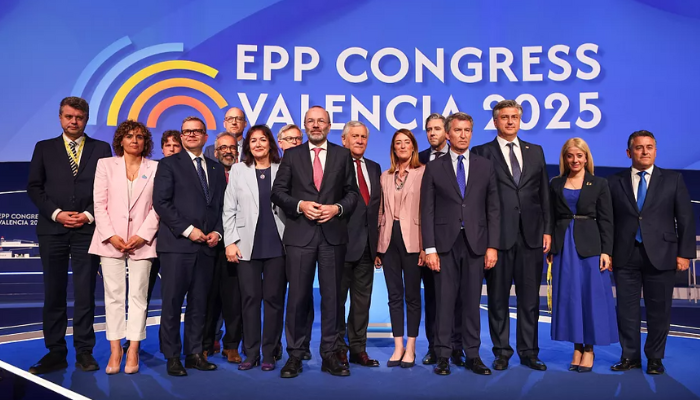As the European People’s Party (EPP)—Europe’s largest political group—convened in Valencia, Spain, this week, a wave of power outages across the Iberian Peninsula didn’t stop major political messaging from unfolding. Here’s what we learned from the EPP Congress 2025.
Manfred Weber Consolidates Power at the Helm
Manfred Weber solidified his position as the undisputed leader of the EPP, winning re-election as party chief with a commanding 89% of the vote (502 out of 563). His close ally Dolors Montserrat was similarly elected unopposed as Secretary General, receiving 91% backing—figures reminiscent of near-total endorsements seen in autocratic regimes. This consolidation of power places Weber at the head of a robust political machine that includes Commission President Ursula von der Leyen, 13 EU commissioners, numerous prime ministers, and 188 MEPs.
EPP Shifts Further to the Right
The ideological center of the EPP appears to be tilting rightward, with strong sentiment in Valencia in favor of inviting Giorgia Meloni’s Fratelli d’Italia party into the fold. In contrast, Irish Tánaiste Simon Harris struck a centrist tone, calling for broader cooperation with pro-European forces. His message of unity and moderate leadership received only tepid applause, highlighting the party’s drift away from the center.
Competitiveness Trumps Climate Goals
The Green Deal came under fierce criticism from multiple party heavyweights. Italian Foreign Minister Antonio Tajani labeled it “a disaster,” while Friedrich Merz of Germany dismissed parts of it as “nonsense.” Greek Prime Minister Kyriakos Mitsotakis emphasized the need to prioritize economic competitiveness over regulatory burdens, urging Europe to become a “factory of growth” rather than a “factory of rules.”
This narrative marks a strategic pivot for the EPP, reframing economic growth as the new political priority ahead of the 2024 European elections.
Friedrich Merz Reintroduces Germany to the EPP Stage
The event marked a symbolic return to prominence for Germany’s Christian Democrats, now leading the government in Berlin. Friedrich Merz used the congress as a platform to assert Germany’s renewed commitment to EU affairs. He emphasized the importance of European defense readiness and declared that Germany will lead from the front on foreign policy under the CDU’s stewardship. His message of assertive diplomacy and military readiness drew strong applause.
Ursula von der Leyen’s Green Deal Stance Sparks Tension
Although Ursula von der Leyen took a more explicitly partisan stance than usual, her unwavering defense of the EU Green Deal put her at odds with many in her party. While Tajani condemned the climate plan, von der Leyen’s spokesperson reaffirmed her support: “President von der Leyen fully stands by the Green Deal,” said Paula Pinho, rebuffing internal criticism.
Tensions also surfaced around von der Leyen’s outreach to flood victims in Valencia, some of whom criticized the local EPP-led government’s response during last year’s disaster. Her gesture—an upcoming meeting in Brussels—reportedly caused unease among regional party officials, revealing fractures in party unity.

